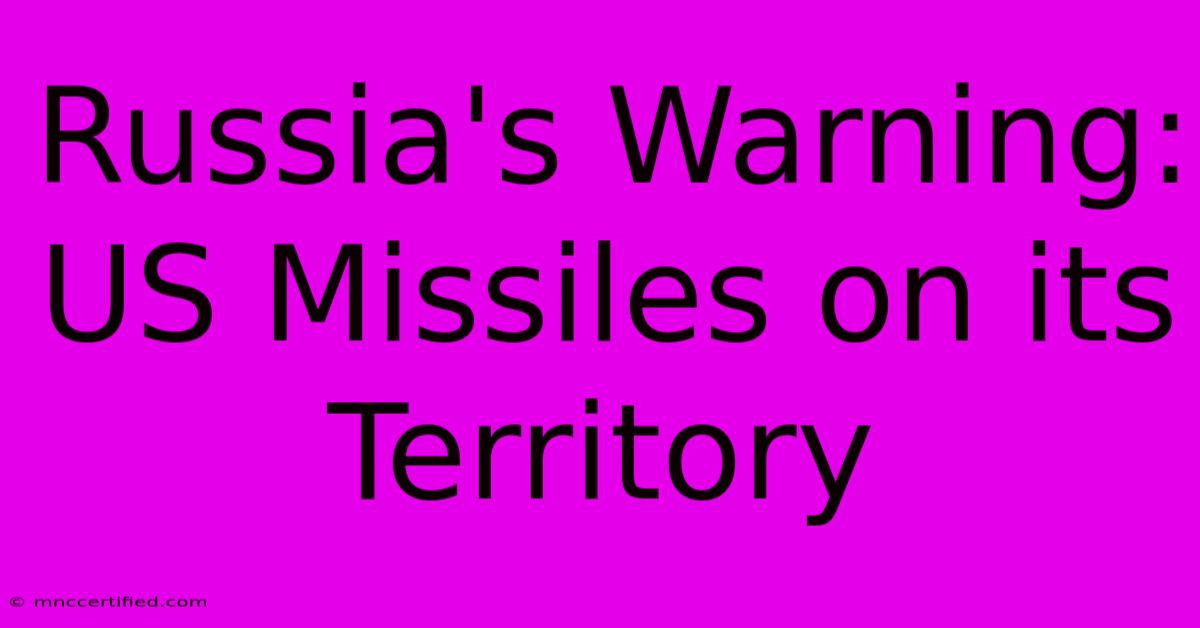Russia's Warning: US Missiles On Its Territory

Table of Contents
Russia's Warning: US Missiles on its Territory – A Deep Dive into Geopolitical Tensions
Russia's repeated warnings about the potential deployment of US missiles on its territory have significantly escalated geopolitical tensions. This article will delve into the historical context, the current situation, and the potential ramifications of this increasingly volatile situation. Understanding the nuances of this complex issue requires examining the perspectives of all parties involved and analyzing the potential consequences of escalation.
The Historical Context: A Legacy of Mistrust
The current tensions are rooted in a long history of mistrust and rivalry between the US and Russia, dating back to the Cold War. The fear of encirclement and the perceived threat of hostile military deployments have been recurring themes throughout this period. Past incidents, including the Cuban Missile Crisis, serve as stark reminders of the potential for catastrophic miscalculation. Understanding this historical baggage is crucial to interpreting Russia's current concerns regarding US missile deployments.
The Role of NATO Expansion
The eastward expansion of NATO, a military alliance originally formed to counter the Soviet Union, is a key element in Russia's perspective. Russia views this expansion as a direct threat to its national security, particularly given the deployment of NATO forces and infrastructure closer to its borders. This perception fuels the anxieties surrounding potential US missile deployments, seen as a further encroachment on its perceived sphere of influence. The lack of meaningful security guarantees for Russia from the West has only exacerbated this issue.
The Current Situation: Accusations and Denials
Russia has repeatedly accused the US of planning to deploy missiles capable of reaching Russian territory, citing intelligence reports and geopolitical analysis. These accusations have been vehemently denied by the United States, which maintains that its actions are purely defensive and aimed at deterring aggression. However, the lack of transparency and the ongoing strategic competition between the two nations make it difficult to verify either side's claims definitively.
The Information War: Disinformation and Misinformation
The current information environment is characterized by a surge in disinformation and misinformation, making it challenging to ascertain the truth. Both sides have engaged in strategic communication campaigns, utilizing media outlets and social media platforms to shape public opinion and influence the narrative surrounding missile deployments. Critically evaluating information sources and identifying potential biases is essential in navigating this complex information landscape.
Potential Ramifications: A Dangerous Game of Chicken
The potential consequences of a full-blown confrontation are severe and potentially catastrophic. The risk of accidental escalation, due to miscalculation or miscommunication, is particularly high. The possibility of a direct military conflict between nuclear powers is a stark reality that underscores the gravity of the situation. Moreover, the economic and humanitarian ramifications of such a conflict would be devastating, affecting not only the two nations involved but the entire global community.
The Need for Diplomacy and De-escalation
The urgent need for diplomacy and de-escalation cannot be overstated. Open communication channels, transparency, and a commitment to mutual security are essential in preventing a catastrophic escalation. International efforts towards arms control and conflict resolution are critical in navigating this perilous situation. Ignoring the concerns of either side is a recipe for disaster.
Conclusion: Navigating a Complex Geopolitical Landscape
The issue of potential US missile deployments on Russian territory is a multifaceted problem with deep historical roots and far-reaching implications. Understanding the historical context, the current accusations and denials, and the potential ramifications is crucial for informed analysis. A concerted effort towards diplomacy, transparency, and mutual security is paramount to mitigating the risks and preventing a potential catastrophe. The international community has a vital role to play in fostering dialogue and de-escalating tensions to prevent a dangerous escalation of this volatile situation.

Thank you for visiting our website wich cover about Russia's Warning: US Missiles On Its Territory. We hope the information provided has been useful to you. Feel free to contact us if you have any questions or need further assistance. See you next time and dont miss to bookmark.
Featured Posts
-
United Equitable Insurance Claims
Nov 19, 2024
-
One Tree Hill Star Paul Teal Passes Away
Nov 19, 2024
-
Sample Letter To Cancel Insurance
Nov 19, 2024
-
I M A Celeb Coleen Rooneys Wagatha Trial
Nov 19, 2024
-
Russia Warns Us About Ukraine Attacks
Nov 19, 2024